- Home
- Anthony Bourdain
Anthony Bourdain: The Last Interview Page 5
Anthony Bourdain: The Last Interview Read online
Page 5
DUPLIEX: But there is surely an opportunity, surely, for those young chefs to adopt the technology but then turn it ‘round and use where they are and who they are to create something new.
BOURDAIN: Yeah. I’ll come back to Dave Chang, Wylie Dufresne, people like that who, you know, they cherry pick: “Hey, that looks really interesting! We can make a really delicious dish that’s actually soulful and reminds people of their childhood, but we’re using a technique that Ferran Adrià developed.” Nothing, nothing wrong with that. It’s when it becomes like an eye gouging experience, you know it’s something hanging on the edge of a long prong and it’s not very good. You know, if it takes your waiter ten minutes to describe the dish and two minutes to eat it…
[Audience laughter]
Is it fun? That’s all. Is it fun and is it delicious? If the answer is yes then I’m for it.
DUPLIEX: You’ve recently written, not quite an episode, but scenes, a sort of a stream, for an amazing television series called Treme, which must be—Oh and your face lights up every time somebody says Treme!—it must be a thrill. I mean, it’s a thrill to watch the bloody thing so it must be a thrill to write for it.
BOURDAIN: I found suddenly, I don’t know when it happened, but I found myself at this weird point in my career where I realized that…opportunities would pop up to work with really amazing people who I really admire, or worship. And you know, I can actually, you know, just to hang out with some of these people is, is—you know, I’m stammering here. So out of the blue, I mean, to me, The Wire was the greatest thing ever in the history of television. I mean, there’s never been a better use of the television medium, never been a better dramatic series. So to get a call out of the blue form David Simon was just this devastat—
DUPLIEX: That happened like that? He just rang out of the blue?
BOURDAIN: Yeah. “Would you be interested in doing some writing for me?” It was like you’re a football fan, you’re home, you’re a little kid, you’re a football fan and David Beckham calls up and says, you know, “Let’s kick the ball around.” You know, I teared up, I hyperventilated, I would have done it for free. And in fact, there are a few things that I’m doing in my life right now where, you know, it’s not about the money. It’s really…fun. It’s the most fun I’ve ever had writing or doing any kind of work, working with people much smarter than me, these incredibly creative people, it’s just…You know it’s like you get invited to join the cool kids. And, um, so I am.
I’m doing a graphic novel with a really amazing artist named Langdon Foss and a friend of mine named Joel Rose, because, you know, it’s not gonna make me rich, I’m doing it because I can, and it’s fun and I like comics and, you know, it’s cool.
DUPLIEX: And you’ve set up your own TV production company for your own TV—
BOURDAIN: I’m partners in a production company that I started with—the camera people on my first series of A Cook’s Tour and I all quit Food Network at the same time because we’d set up a show with Ferran Adrià and the network was not interested. So, they go like “Who is this guy? He talks funny, he’s from Spain, it’s too smart for us, we’re not interested.” So we all reached in our own pockets—we figured well we’ve set this up, we’re gettin’ this. This is history here, we have incredible, amazing, once-in-a-lifetime access, we’re getting this show up. We had no customer, no money, we just reached in our own pockets and went out and shot a documentary about the experience. And that was the beginning of this entity that then that continues to create No Reservations, the same group of people.
So really, we owe it all to Ferran. If he hadn’t said, “Yes, I invite you to come into my life and film it,” I might be riding a pony from barbeque competitions to barbecue competitions on Food Network…
DUPLIEX: Bringing out a line of burgers or something, yeah, we look forward to that. The Bourdain Burger line.
BOURDAIN: [Laughs] Yeah, not gonna happen. Not in this life.
*1 Michelin stars, a rating system used by France’s Michelin Guides series. Three stars is the highest rating, and rarely granted.
*2 Jonathan Gold (1960-2018) was a food and restaurant critic for Gourmet magazine and the Los Angeles Times
*3 El Bulli was an award-winning restaurant located in the Catalonian countryside. It was known for its association with molecular gastronomy, and was run by several well-known chefs, perhaps most notably Ferran Adrià. It closed in 2011.
*4 Jöel Robuchon (1945-2018) was a French chef and restauranteur who operated restaurants around the world. He won more Michelin stars (32) than any other chef.
*5 Eric Ripert is a French chef known for his abilities as poissonier, and as the head chef and proprietor of Le Bernardin in New York City, a three-star Michelin restaurant that is regularly noted on best-of lists in culinary magazines as one of the world’s top restaurants, and as the “Temple of Seafood.”
*6 Chickens.
*7 Bourdain had done a speaking event with Adrian Anthony Gill, the noted British food writer, two days earlier at the Festival.
*8 Durian is a notoriously foul-smelling fruit found in southeast Asia.
*9 An acclaimed New York Times reporter and editor who wrote about politics, travel, and food, and was a renowned gourmand.
*10 Roger Vergé (1930–2015) was one of the most influential chefs and restauranteurs of the 20th century, renowned as one of the creators of nouvelle cuisine. At his restaurant Moulin de Mougins in the French Riviera, he trained numerous chefs that went on to fame, including David Bouley, Alain Ducasse, and David Boulud.
*11 The highly-regarded Spanish chef often associated with molecular gastronomy. He was, for many years, the head chef at the El Bulli restaurant in Catalonia.
ANTHONY BOURDAIN DISHES ON FOOD
INTERVIEW WITH NEIL DEGRASSE TYSON
STARTALK WITH NEIL DEGRASSE TYSON
APRIL 7, 2013
NEIL DEGRASSE TYSON: People always say “Oh, I’ve been to this country, and this food is a delicacy there.” That’s a cue to me that the food tastes nasty, or it’s some bug that they pulled out of the ground and sautéed. So, what’s with people saying something is a delicacy?
ANTHONY BOURDAIN: Well, it’s rare or expensive, you know? It’s valued more than the way we look at shrimp or lobster or truffles as the good stuff, a lot of people in this world look at ingredients that many of us would probably have some difficulty with. That’s an attitude that changes really quickly…the more you travel. You know, that’s something I got over very quickly. Particularly, you know, you talk about, wow, their food in Thailand is really repulsive to me. I mean, they eat bugs! But the Thais, who are largely a non-dairy culture, you know, try to put yourself in their shoes. They’re looking at us—you know, eating, like, cottage cheese or Roquefort would be truly horrifying, if you think about it for a second, what that must look like.
DEGRASSE TYSON: What I do find interesting though, is you go from one country to the next, and one of the simplest measures of this is what is the assortment of flavors they infuse in their potato chips that they’re selling. So like in Japan, they have fish-flavored potato chips. I mean, we eat fish here, but I don’t know that that would sell.
BOURDAIN: There are whole spectrums of flavors that other countries, other cultures, take for granted and require in their diet. In the Philippines there’s a whole bitter component that we are almost instinctively not happy with. They will introduce bile into dishes to give it that welcome bitter note. There’s a tradition of rotting things, like fermenting fish, getting it really, offensively funky by our standards, just ‘cause, I think, out of boredom.
DEGRASSE TYSON: It introduces another flavor.
BOURDAIN: And it’s worth noting also that we—Western societies, anyway—used to do that. For the Roman times, the condiment of choice was essentially something called garam, which was essentia
lly rotten fish guts and rotten fish sauce. This was the salt, the principal seasoning ingredient, all across Europe. So even our own tastes have changed.
I think the last, for a lot of people, the last frontier is the textural thing. Particularly in Asia, they like squishy, or even rubbery, chewy, or a lot of traditional European cultures, you know, cartilage texture—that’s something we really have a problem with. We tend to like crispy. Once you cross that border, you’re really someplace special.
To get back to your question about delicacies, you’ve got to ask always, is there an assumed medical component to what we’re talking about also? I think a lot of what we consider the really freakiest foods, the eye-popping, what the, why would you eat that—a lot of that has either folk medicine, or traditional Chinese medicine applications, or they’re…You know, a regular feature of my life in China is if something arrives still wriggling, or there’s a sex organ involved, it’s usually accompanied by winking and banging on the bottom of the table, and someone saying, “This will make you strong,” you know, “many, many sons, you go home,” and it’s like, oh God…
DEGRASSE TYSON: Tell me about these diets—we call them diets, but it’s just the mainstay culinary offerings in various parts of the world. There’s a lot spoken of the Mediterranean diet, or the Japanese diet, and they live a long time, heart disease is low…From your life experience, is all that true?
BOURDAIN: No doubt about it. You go to Crete, for instance—
DEGRASSE TYSON: Well I guess we know it’s true, but are we going to credit the food, or because there’s no stress? How big a factor is the food?
BOURDAIN: I’m guessing, you’re a Vietnamese rice farmer, you’re working hard. You are working hard. And there is stress in your life. Especially if you’ve been through three or four wars in the last thirty years. I don’t think that’s it. I think clearly the ratio, in much of the world—you know, I’m a confirmed carnivore, but clearly there’s something to be said for cultures where the ratio of meat, of protein, to fresh vegetables is completely different. Ours—
DEGRASSE TYSON: The opposite.
BOURDAIN:—is distorted. Much of the cultures we’re talking about, they use meat or bone or protein almost as a flavoring ingredient. Very carefully, much more valued.
DEGRASSE TYSON: A condiment, almost.
BOURDAIN: You have delicious—for the most part—vegetables, generally a filler like starch, whether it’s rice or cassava or potatoes. Wherever it is, clearly it has an impact on what your body looks like and how long you’re going to live. No doubt about it.
DEGRASSE TYSON: Now, you’re over six feet tall. In Japan people hardly ever get to that height. So is it a tradeoff between that kind of diet and whether you grow tall?
BOURDAIN: Well, I don’t think it’s a tradeoff we make anymore, because they’re getting taller and bigger, there’s no doubt about it, as they become fonder of Western food and processed food. I mean, the same thing is happening there as here: the bulking of the world. But I think yeah, there clearly is.
I mean, one of my favorite—you know, I’m not particularly well inclined—as much as it might be good to eat more vegetables and less animal protein, I’m not particularly well-inclined toward really hardcore, unwavering vegans. So one of my favorite statistics is that apparently vegans in non-industrialized cultures seem to do much better than vegans in industrialized cultures. And people were trying to figure out why that was, why they were living longer and seemed healthier. [Laughing] Apparently the insect parts and carcasses in rice are much higher than in non-industrial cultures.
DEGRASSE TYSON: It’s left in the product?
BOURDAIN: Yeah. So, basically, they’re getting a lot more animal protein.
DEGRASSE TYSON: [Laughing] Insect protein. We’re flicking away the insects out of our vegetables.
BOURDAIN: Very high in protein, bugs, by the way. People eat those for a reason.
DEGRASSE TYSON: What do you think of all the gadgets that help people cook food? Like great infomercials?
BOURDAIN: In almost every case they’re completely worthless. “The Salad Shooter: The Ultimate Salad Delivery System.” I mean, is cutting lettuce so hard? Something that will cut onions for you is completely insane, as far as I’m concerned. Two good knives—a serrated knife for bread, and maybe tomatoes, and a good quality chef’s knife—is all you need. And a cutting board, a couple of good, heavyweight pans, and there is very little that you can’t do.
DEGRASSE TYSON: How do you distinguish between tricks—and I don’t mean it in a circus sense, but just secrets—versus ten years of doing it? You serve a food to someone and they say, “what’s your secret?” as though they can just tell that to them and then tomorrow they can do exactly what you made. At what point do you say, “Look, I’ve been at this my whole life”?
BOURDAIN: There are no secrets. The secret of the restaurant business and professional cooking is there are no secrets. It is a mentoring business. Chefs spend their whole lives learning stuff, and then, because of the nature of the business, every few months teach everything they know, invest time they don’t have, in teaching somebody everything they know so that they can maybe have a Sunday off, and that they can count on a crew. It is a military hierarchy, and it is import—there are no secrets. There are no secret recipes. There are no secret techniques. Everything that you learn in a kitchen you are either told, open-source, by your immediate superior and that’s been shared with everybody in the kitchen, or you have learned it over time, painfully. You know, the ability to tell when a steak is cooked by listening to it in the pan or on the grill. Or determining that a piece of fish is probably ready to come out of the pan just from the sound of it—these are things you learn through repetition. And that is the great secret. It’s that this is how professionals learn, this is how home cooks should learn. People shouldn’t be intimidated by recipes. They should understand that professionals learn through getting it wrong, getting it wrong, getting it wrong, getting it wrong, starting to get it right, eventually getting it right, until it became second nature. It’s repetition, repetition, repetition. You learn all of these things, even if you don’t understand the technical, the science behind why your stew is transforming, why it’s becoming thick as it cooks longer, why your egg scrambles, why the steak gets dark on the outside when you expose it to heat. You may have no understanding of the science behind that, but you instinctively—of course through repetition—understand it, you learn to use it, and you count on it.
DEGRASSE TYSON: Now, you’ve used two words in our conversation as fluently as any scientist that I know. First, “E. Coli” just rolled off your tongue.*1
BOURDAIN: Yep.
DEGRASSE TYSON: And “tectonic shift” rolled off your tongue. [Both laugh] So what is your science background?
BOURDAIN: High school science.
DEGRASSE TYSON: High school science? Cool. But you liked it, I guess?
BOURDAIN: I did. But, you know, people talk about things in kitchens, like “what’s happening, why is my steak getting brown?” The caramelization of protein, the Maillard reaction*2—it’s kind of cool to know. It helps you out to understand.
DEGRASSE TYSON: I’m betting you didn’t learn the caramelization of sugars in high school chemistry.
BOURDAIN: No, we learned it real quick—the first time you stick your figure in some, you learn it on a cellular level. How come that’s hotter than water? I hadn’t counted on that.
DEGRASSE TYSON: It’s way hot.
* * *
—
DEGRASSE TYSON: Maybe it’s more true in America than in other places, but we shield ourselves from—particularly in the carnivorous realm—we shield ourselves from the animal itself. We buy a chicken, you don’t see the feet. You don’t see the head. You know? It’s just packaged, and it’s just a piece of meat. Is that a good thing? You’r
e probably going to say it’s a bad thing—
BOURDAIN: No, it’s a terrible thing.
DEGRASSE TYSON: But why? Why do you even care?
BOURDAIN: Okay. For a whole lot of reasons. It’s always good to know where your food came from. It’s only fair and just. My friend Fergus Henderson*3 was a pioneer of what’s called the “nose to tail” movement. He says, it’s only polite. If you are going to kill an animal—or, more often, have an animal killed—for your restaurant or your kitchen, it’s only polite to eat as much of it as possible, to not waste. People should understand where their food comes from, how it was raised, what the impact might be on society as a whole in that process. But I think also, just as sentient, caring people, a decent person would prefer that their animal is raised reasonably happy and killed with a minimum of cruelty.
DEGRASSE TYSON: But if before everyone ordered their cowboy steak, if they said, “Go outside, find the cow that you want us to slaughter, look it in the eye, and pull this trigger and shoot it in its head—”
BOURDAIN: Honestly, I think that’s an experience…the more people who can do—
DEGRASSE TYSON: A cow with big eyelashes, you know.
BOURDAIN: It is something I’ve done. You know, when you travel this world, you meet your dinner frequently. It’s difficult. When you’ve killed your first pig, you really start to abhor waste, disrespect to the ingredient…I’m a lot more careful about how I cook my pork now, you know? I understand something died for that pork chop, okay? I think that you become a better citizen of the world and a more rounded person when you have seen that process and you’ve made some personal decisions as part of that. But it is a life-changing thing and I think that everyone should take part in it.

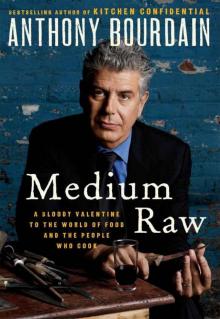 Medium Raw: A Bloody Valentine to the World of Food and the People Who Cook
Medium Raw: A Bloody Valentine to the World of Food and the People Who Cook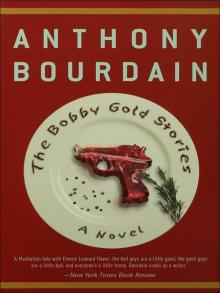 The Bobby Gold Stories
The Bobby Gold Stories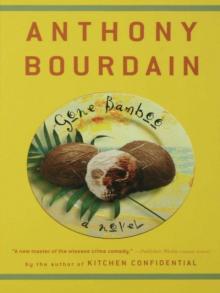 Gone Bamboo
Gone Bamboo Typhoid Mary
Typhoid Mary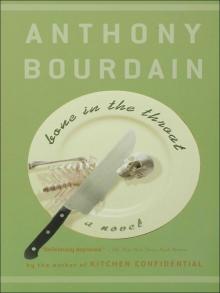 Bone in the Throat
Bone in the Throat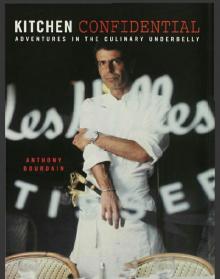 Kitchen Confidential
Kitchen Confidential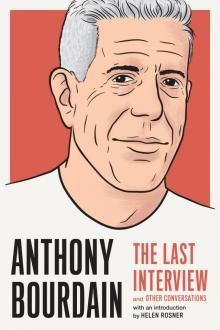 Anthony Bourdain: The Last Interview
Anthony Bourdain: The Last Interview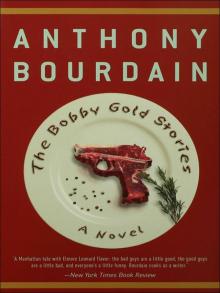 Bobby Gold Stories
Bobby Gold Stories